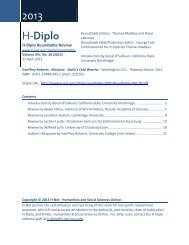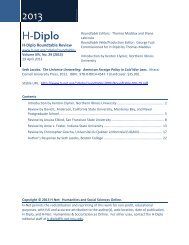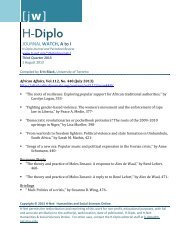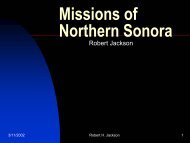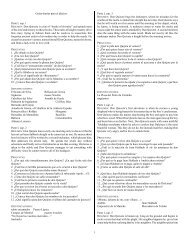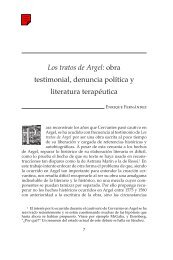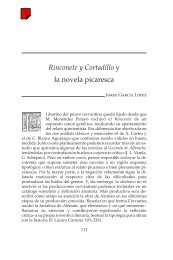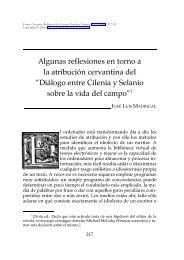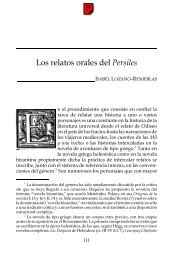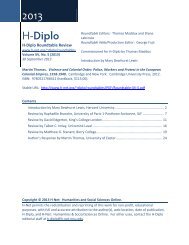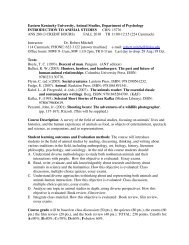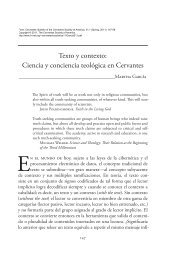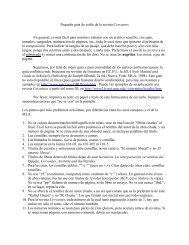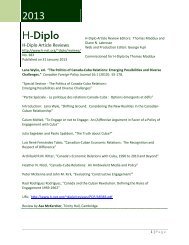The Function of Skepticism in Part I of Don Quijote - H-Net
The Function of Skepticism in Part I of Don Quijote - H-Net
The Function of Skepticism in Part I of Don Quijote - H-Net
You also want an ePaper? Increase the reach of your titles
YUMPU automatically turns print PDFs into web optimized ePapers that Google loves.
Volume 30.2 (2010) <strong>The</strong> <strong>Function</strong> <strong>of</strong> <strong>Skepticism</strong><br />
131<br />
nificant that <strong>Don</strong> <strong>Quijote</strong>’s appeal to authority is found almost by the<br />
end <strong>of</strong> the book. At that po<strong>in</strong>t <strong>in</strong> the lecture the reader has an advantage:<br />
he or she has read the story <strong>of</strong> <strong>Don</strong> <strong>Quijote</strong> almost <strong>in</strong> its entirety.<br />
Furthermore, the <strong>in</strong>formation that the reader has obta<strong>in</strong>ed about <strong>Don</strong><br />
<strong>Quijote</strong> is non-dogmatic, precisely because the story <strong>of</strong> <strong>Don</strong> <strong>Quijote</strong> is<br />
presented as not depend<strong>in</strong>g on any authority. At the same time, given the<br />
destabiliz<strong>in</strong>g elements <strong>of</strong> the text, the reader was forced to suspend judgment,<br />
which means that his or her judgment about <strong>Don</strong> <strong>Quijote</strong> will be<br />
grounded on what he or she has observed about the knight while read<strong>in</strong>g<br />
his story. When the reader f<strong>in</strong>ally encounters <strong>Don</strong> <strong>Quijote</strong>’s argument he<br />
has enough <strong>in</strong>formation to conclude that his argument, and by implication<br />
the Ventero’s argument, is a form <strong>of</strong> dogmatism. Chivalric Romances<br />
have no authority even if they are approved by the k<strong>in</strong>gs and the Consejo<br />
Real. <strong>The</strong>y cannot have authority because the reader has observed that<br />
their falsehoods are the direct cause <strong>of</strong> the protagonist’s ridiculous behavior.<br />
By implication, the Ventero’s argument cannot be conv<strong>in</strong>c<strong>in</strong>g either<br />
because <strong>Don</strong> <strong>Quijote</strong>, who is be<strong>in</strong>g harmed by those books, uses the same<br />
argument. Furthermore, the harm that those books cause to the gentleman<br />
from La Mancha and to the Ventero is directly proportional to their<br />
level <strong>of</strong> dogmatism: it causes more harm to <strong>Don</strong> <strong>Quijote</strong> because he lives<br />
<strong>in</strong> that world, and less harm to the Ventero because at least he acknowledges<br />
that one can no longer be an errant knight: “bien veo que ahora no<br />
se usa lo que se usaba en aquel tiempo” (32, 344).<br />
To sum up, the positions advanced by both characters are shown to be<br />
unconv<strong>in</strong>c<strong>in</strong>g especially because they are non-skeptical arguments, and<br />
their lack <strong>of</strong> persuasion is l<strong>in</strong>ked to their level <strong>of</strong> dogmatism. Cervantes’s<br />
reliance on skepticism is therefore not only deliberate, but also quite effective.<br />
By def<strong>in</strong>ition and methodology, the worse enemy <strong>of</strong> dogmatism<br />
is skepticism.<br />
<strong>Don</strong> <strong>Quijote</strong>’s Dogmatism with Respect<br />
to the Romances <strong>of</strong> Chivalry<br />
We have seen how the story <strong>of</strong> <strong>Don</strong> <strong>Quijote</strong> is constructed <strong>in</strong> part by tak<strong>in</strong>g<br />
advantage <strong>of</strong> skeptical themes. We have seen as well that the explicit<br />
purpose as it is stated <strong>in</strong> the prologue <strong>of</strong> <strong>Part</strong> I is consistent with skeptical



